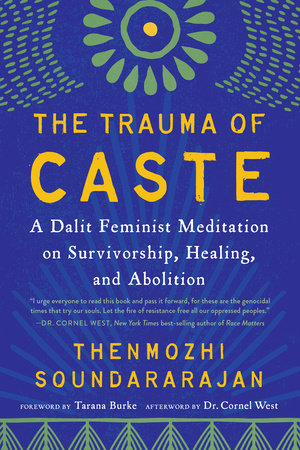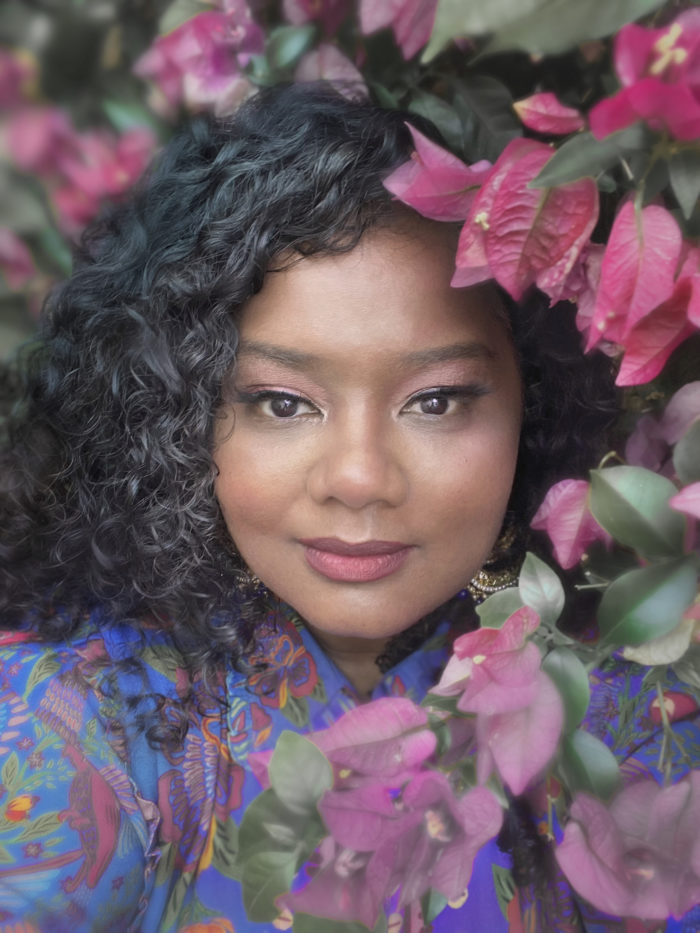
Excerpt: Trauma of Caste
Categories: General Excerpt New Release Society & Politics Spirituality & Religion
Love in a Time of Genocide
An excerpt from Thenmozhi Soundararajan‘s The Trauma of Caste: A Dalit Feminist Meditation on Survivorship, Healing, and Abolition.
 This is really an appeal to the humanity of everyone to think about ways that we might slow the process of genocide by acting differently and choosing life, choosing love. Sometimes when you act out of love, it can feel so desperate when the love isn’t returned, when life is disregarded. But there are so many people who are listening. Our ancestors are listening and standing with us. The children of the next generations will know we stood with conscience against the demons of trauma and were victorious because we were courageous enough to embrace life and to commit to healing.
This is really an appeal to the humanity of everyone to think about ways that we might slow the process of genocide by acting differently and choosing life, choosing love. Sometimes when you act out of love, it can feel so desperate when the love isn’t returned, when life is disregarded. But there are so many people who are listening. Our ancestors are listening and standing with us. The children of the next generations will know we stood with conscience against the demons of trauma and were victorious because we were courageous enough to embrace life and to commit to healing.
The future is not predestined: every moment of the present can influence what comes next. I say this as someone who is Dalit and has seen unspeakable violence; I have also seen remarkable acts of grace, completely out of the blue, simply because one person chose to do a thing outside of what was expected of them from the caste order, the racial order, the genocidal paradigm. Because they just chose life.
So, whatever fears and anxieties we collectively have, I also think we can dream with each other, a world beyond this genocide, a world where we see the wrongs that have happened and we have let them go. This is the ultimate in survivor politics. I think that we can imagine other worlds, other futures together. Healing multiverses where all things are possible because our hearts know it to be so. A Dalit feminist multiverse where we are embodied, limitless, and surrounded by love.
We have to imagine like our very lives depend on it, because they do. Do I have faith in us? Absolutely. I know that if we commit to a collective attempt to choose life, recognize trauma, and choose to heal instead of commit to death, then we will see an end to this terrible moment in history. But we must start, and I hope fiercely that begins today.
There’s a beautiful story of the Buddha from before he achieved enlightenment. As he was sitting in meditation under the Bodhi tree, demonic forces tried to take him. The demon king demanded that Buddha produce a witness that he was spiritually awake. One of Buddha’s hands was touching the earth, and that was his response to the demon’s demand. The earth says, I am your witness. And just like that, the demons vanished, and the Buddha achieved enlightenment.
When people are caught up in their wound and the thrall of dehumanization, they are fundamentally broken apart from life, and this act of touching the earth can be the reminder of our interconnectedness, which makes genocide impossible. Even now we can choose life. The opposite of genocide is life, and choosing life means touching the earth and reconnecting.
When we turn away from death and touch the earth, perhaps we can see the way to life, a life that can be awakened if we truly understand our link to the earth, the complex and loving support it provides for us, which we can provide in turn to other living beings. And if we could do so, perhaps we would also have the courage to put down the sword and open slowly for another way. Our enemy could, one day, simply become a fellow being connected to the source of life. Together we could look with clear eyes at the bloody history that we share.
We could re-story our lives and return gently to creating a sense of meaning and identity with dignity. We could let the earth bear witness to that. It might feel impossible to do this. The train of genocide feels unstoppable, as the flow of capital, white supremacy and Brahminism, and global apathy greases the tracks for its inevitability. But as Professor Cornel West reminds us, “Never forget that justice is what love looks like in public.” And every Dalit who is alive can tell you that when we are rooted in love, we are rooted in an unstoppable force that can make the impossible possible for all of us. The only reason we are here is because our ancestors loved us so much that they sacrificed for us to be here. And every breath we take is a gift of that love and the potential of the healing power of life.
In testimonies of every genocide that we’ve ever had on the subcontinent, you will hear unspeakable acts of desecration, but there are also always stories of people who survived because neighbors and friends chose life, and they turned away under the intense pressure of the death cult to give shelter, to give succor, to say we are interconnected, despite it all. And that perhaps is one of the biggest lessons of what love can do in the time of genocide. I am so clear that by writing this there may be attempts to slander and deplatform me. Feeble attempts to distract from the terror of the truth I am sharing. But I am not here from a place of ego, I am here to serve the species. This is not my truth but a truth that millions are holding with fear. It is my duty to speak this with courage and empathy. For I love all of us, and I extend loving-kindness to all the suffering and trembling hearts dreading what comes next. I am a survivor of dehumanization. I have been called unspeakable things.
I can tell you that the consequence of being dehumanized is that you are more tender. You tremble at the fact of having to tell your truth. And yet the truth is this tremendous vehicle that frees you. To face my perpetrators, to face those who deny caste and deny even this moment of genocide—despite deep fear and anxiety—I can tell you that the courage to be able to speak this truth is not really from me. It’s from so many generations before who already faced the terrors of caste and who want this to end in our lifetime.
If all of us can find it within ourselves to speak out, to act with courage, imagine what could happen.
When I think about the darkness of this moment, the staggering amount of infrastructure that has already been put into place for this terrible shadow of genocide, and how much despair exists in people’s hearts, writing a love letter may seem a strange response. Yet I believe this is precisely the kind of medicine that people need. It reminds me of Rilke in his book Letters to a Young Poet where he writes, “Perhaps everything that frightens us is, in its deepest essence, something helpless that wants our love.”5 Can we love ourselves and confront our terrors so that we can return our moment back to light?
For wherever there have been the darkest hours of human history, there have always been humans who hold up the light. And that’s because the moral law of the universe trends toward life. Genocide is the ultimate failure to the law of life.
To choose life, then, is to say we work to stop genocide before it begins in earnest.
The world has to stand up and say: No. Never again.
This is the need of the hour.
The Trauma of Caste is out November 15, available from NAB and wherever books are sold.
About the Author

Thenmozhi Soundararajan is a Dalit American artist, organizer, technologist, and theorist. Currently, Thenmozhi is the Executive Director of Equality Labs, one of the largest Dalit civil rights organizations working to empower caste-oppressed people in the US and globally. Through her work at Equality Labs, Thenmozhi has mobilized South Asian Americans towards dismantling eons-long systems of oppression, with the goal of ending caste apartheid, gender-based violence, white supremacy, and religious intolerance.
Her intersectional, cross-pollinating work—research, education, art, activism, and digital security—helps to create a more generous, global, expansive, and inclusive definition of South Asian identity, along with safe spaces from which to honor the stories of these communities. Thenmozhi’s work has been recognized by the U.S. Congress, The Smithsonian Asian Pacific American Center, The Producers Guild of America Diversity Program, The Museum of Contemporary Art, The Sorbonne, Source Magazine, Utne Reader, The National Center for the Humanities, and The National Science Foundation. She is a frequent contributor on issues related to South Asia, caste, gender, and racial Equity, as well interfaith issues and peace building, and has been featured in the New York Times, Washington Post, BBC, Guardian, ABC, and NBC news. She was also an inaugural fellow of the Robert Rauschenberg Artist as Activist, Atlantic Foundation for Racial Equity, and is a current fellow at Stanford Center for South Asian Studies. You can order her new book The Trauma of Caste from North Atlantic Books to learn more about her work around caste equity, abolition, and healing. Find her on her socials @dalitdiva or Equality Labs at @equalitylabs



